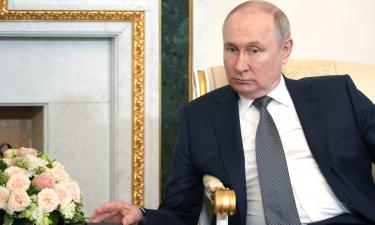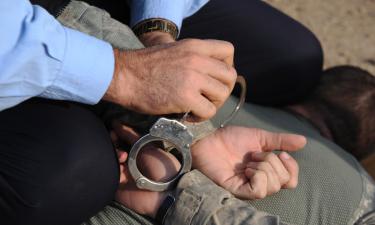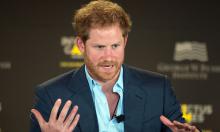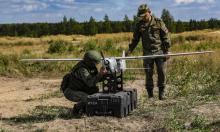Cooperation Plan Between NATO and Ukraine Exposed - 23 January, 2003 - News
The plan mentions the things, which can hardly be found in Ukraine
The plan of Ukraine and NATO’s actions has been exposed. The plan was approved in November of the last year. The text of the document is published on the official site of the Ukrainian Foreign Ministry, as well as on NATO’s official website.
The plan of actions was developed “in compliance with the decision of Ukraine-NATO committee with a view to deepen and extend the relations between Ukraine and NATO.” The plan reflects the strategy of relations between Ukraine and NATO. It is based on the special partnership charter, which was signed in Madrid on July 9th, 1997. The charter still remains the basis of the relations between Ukraine and NATO. The text of the document has been published for the first time, which makes people ask questions. As it turned out, the plan of actions was secret.
As Observer news agency reported, it was decided to make the document public at a session of NATO’s political committee last week. This was a response to Ukraine’s address. Yet, it is not clear, what secrecy that plan could have, if it had a goal to identify Ukraine’s strategic goals and priorities in order to assist in its integration in NATO structures. Another goal to pursue for Ukraine is to create the strategic framework for the present and future cooperation with NATO on the ground of the mentioned charter.
Pursuant to the plan, Ukraine will have to continue running its home policy based on the strengthening of democratic values and rights, respect to human rights. Ukrainian home policy is also supposed to have independent courts, democratic elections and distributed power. All that should be done on the ground of OSCE norms, political pluralism, freedom of speech, respect to the rights of national and ethnic minorities, no political, religious, or ethnic discrimination. As it seems, NATO believes that Ukraine runs such policy at the moment. However, Ukraine will have to have adequate laws in order to make this policy come true.
The document particularly runs: “An important element of reforming the legal system is the participation in Council of Europe conventions, which identify common standards for European countries. Efforts must be aimed at reforming law-enforcement bodies, amending the mechanisms for all states to observe the supremacy of right, strengthening the role of the structures that defend civil rights.”
The plan particularly stipulates the strengthening of democratic and election institutions, the strengthening of the judicial power independence and authorities, the assistance to the constant development of the civil society, the strengthening of the civil democratic control over the Armed Forces and security departments on the whole. There are a lot of other things like that mentioned in the document. It is really hard to believe that those things actually exist in Ukraine. For example, the document mentions the necessity to struggle with corruption, money-laundering and illegal economic activities with the help of economic, lawful, law-enforcement measures. The plan also runs that there should be special measures conducted in order to pull Ukraine out from the FATF list. It is NATO that will probably help Ukraine to leave the FATF list, if it defeats the invincible Ukrainian corruption, of course.
Speaking about the balance between three branches of power (judicial, executive and legislative) and their efficient cooperation, the document says that it is supposed to be achieved by means of constitutional and administrative reforms. This is actually a slogan of the Ukrainian opposition. The Ukrainian leadership will also have to reform its state bodies in the field of the national security and defense. This reform is supposed to reflect Ukraine’s European-Atlantic policy, the total observation of international obligations for weapons control, expansion of the participation in the international struggle with terrorism, including the complete execution of all UN Security Council resolutions concerning this issue. In other words, it means that Ukraine must not sell any radar systems to Iraq. One also has to strive for the strengthening of border security and export control systems with a view to struggle with mass destruction weapons proliferation and money-laundering.
Ukraine will have to get its economy closer to NATO standards, for Ukraine’s foreign economic priority is to get totally integrated in the world economic space and to deepen the international economic cooperation. This means that Ukraine will have to guarantee the observance of citizens’ economic liberties and rights in every possible form, including the protection of intellectual property rights. Ukraine will need to run economic and structural reforms, fulfilling the recommendations from the World Bank, the International Monetary Fund, and other international organizations; to create conditions that will be necessary for joining the World Trade Organization, and so on and so forth. Other things include the improvement of people’s well-being and the creation of necessary prerequisites to form the middle class.
To crown it all, the document says that freedom of speech principles and the free distribution of information is the corner stone to set up a democratic society and state. As it turns out, Ukraine supports Resolution 59 of the UN GeneralAssembly. This resolution proclaims that the freedom of information is the basic human right for all other freedoms. Nevertheless, the document mentions further on: “Although the adequate Ukrainian law contains important paragraphs regarding the guarantees of freedom of speech and information, Ukraine is determined to improve the general judicial system, in which mass media outlets work, to strengthen freedom of expression, and to assist in removing obstacles on the way of media activities.” One shall assume that Ukrainian officials did their best to implement this paragraph, when they did not allow Ukrainian Pravda reporters to gain entry to press briefings at the Office of the Prosecutor General of Ukraine. Moreover, the document explicitly says that all those freedom of speech issues were coordinated on a joint basis.
The document also contains the tasks in the field of army reform, cooperation between NATO and Ukraine, information protection principles, as well as the issues of funding the joint actions. There are no certain figures to illustrate that, though. To all appearance, the figures can be found in the target plan (such plans are going to be passed every year), which remained secret. This was probably done in order not to frighten Ukrainian tax-payers in advance.
It is strange, but the publication of Ukraine-NATO plan of actions coincided with the publication of opinion poll results. The poll was conducted by Social Monitoring center and the Ukrainian Social Research Institute. According to the results of the poll, the level of Ukrainian people’s confidence to NATO dropped by eleven percent over the recent months. Thirty-nine percent of Ukrainians trusted NATO in June of the last year, while the index changed to 28% in January of the current year. Forty-four percent of Ukrainian citizens do not trust NATO completely vs. 34% in June of 2002. The number of people, who consider NATO the “world gendarme” increased from 17% to 20% in Ukraine over the mentioned period. Those, who believe that NATO is a “peacemaking organization,” lost three percent in their number. Sociologists explain this tendency with the recent scandal, when Ukrainian President Leonid Kuchma was not invited to Prague to take part in the NATO summit.
Andrey Lubensky PRAVDA.Ru
Translated by Dmitry Sudakov
Subscribe to Pravda.Ru Telegram channel, Facebook, RSS!




